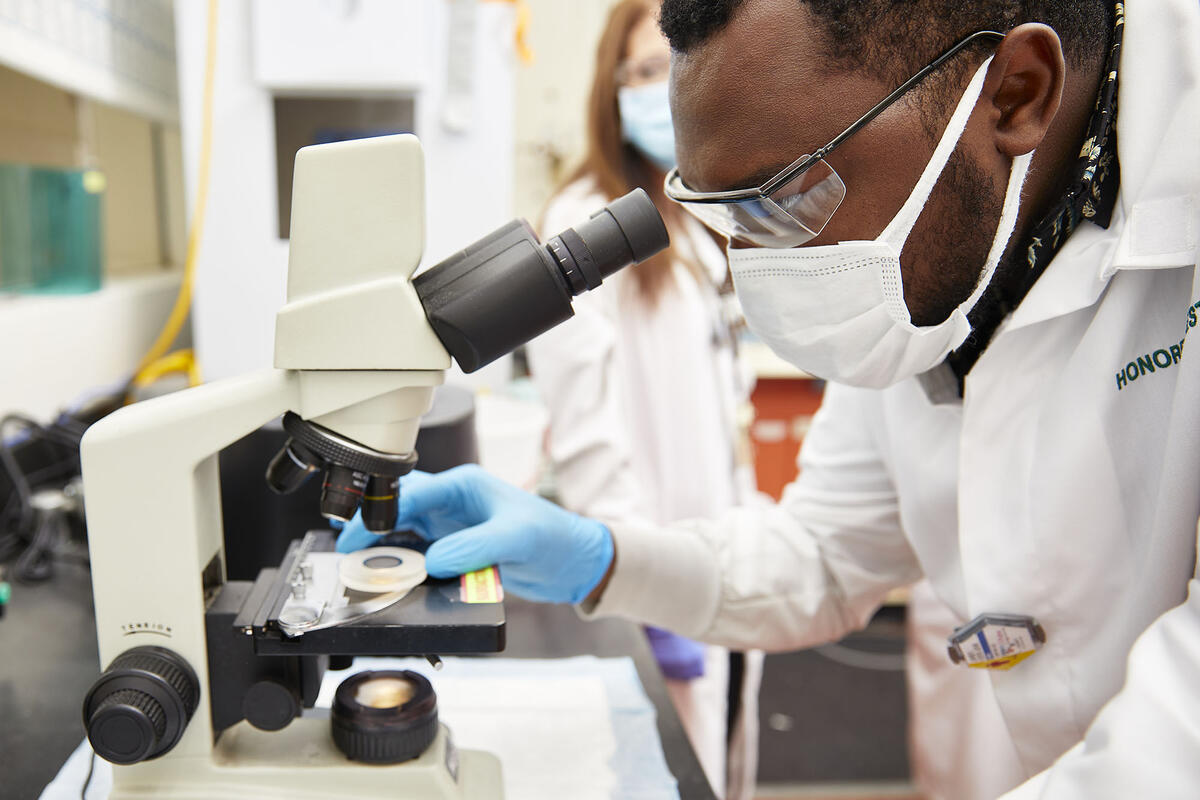UNLV is one of the few universities in the nation that is allowed to use a number of radioactive isotopes in its labs not typically seen at the university level. This unique access offers unprecedented research opportunities and a proven way for Ph.D. students in the Radiochemistry Program to land jobs after graduation.

Program director Artem Gelis says UNLV’s radioactive materials license authorizes him to handle plutonium, neptunium, americium, uranium, and technetium, to name a few, and he says he has worked with all of them while at UNLV.
Gelis came to UNLV in August 2018 as an associate professor in chemistry and became director of the radiochemistry Ph.D. program in April 2019. The program was established in 2004 and since its inception it has successfully graduated 43 Ph.D.s, many of whom have gone on to gain employment within the U.S. Department of Energy’s national laboratories, the DOE headquarters, other government sectors, private nuclear industry, and academia.
Gelis has extensive experience working with radioactive isotopes employing radiochemical separation techniques, actinide solution chemistry, radiochemical analysis, electrochemistry, spectroscopy, kinetics, and microfluidics. His research interests are in the area of actinide separations, medical isotopes, and microfluidics relevant to radio-analytical applications.
What is your background?
Prior to coming to UNLV, I was the head of the radiochemistry group in the Nuclear Engineering Division at Argonne National Laboratory, where I worked for 20 years starting as a post-doc. While at Argonne, I was the main contributor to the research and development of the Actinide Lanthanide Separation Process – also known as ALSEP – a new method for reprocessing used nuclear fuel.
I received my B.S. in physical chemistry/chemical engineering from Mendeleev University of Chemical Technology in 1996 and my Ph.D. in radiochemistry at Frumkin Institute of Physical Chemistry and Electrochemistry in 1999.
You developed this program at UNLV – it is one of very few in the country. Why was it important to bring it to Las Vegas?
Nevada has a long glorious history developing nuclear technology at the Nevada National Security Site (formerly known as the Nevada Test Site); therefore, radiochemistry fits nicely in our state environment. Quite a few radiochemistry alumni are part of the Nevada Test Site research and development team.
How do you train your students to make sure they are safe while conducting research?
We operate under the strict adherence to UNLV’s Radiation Safety Manual, approved by the State of Nevada Radiation Control Program and under the guidance of the UNLV radiological safety office in Risk Management & Safety.
Students entering our program receive several modules of training before ever starting work in our labs. They also receive annual re-training in the areas of radiation safety and laboratory protocols.
We have developed a set of safety operational procedures that are rather comprehensive and cover the whole spectrum of lab operations with radioactive elements that everyone working in our labs operates under. Radiochemistry faculty provide in-person supervision for work with higher levels of radioactivity. Students also participate in weekly and monthly laboratory tasks aimed at continuously educating them on the safe handling of radioactive material.
You work with several national and international laboratories. How does this enhance your program?
We actively work with several major national laboratories and private industrial partners. These collaborations allow us to keep our scientific research focus closer to the nations’ interests. Our national laboratory collaborations also help our students gain employment in the DOE sector. This summer alone we have nine students participating in paid internships at the national labs. We have also hosted international students from a number of different laboratories over the years giving our students an international perspective on nuclear science.
What do you teach in the UNLV department of chemistry and biochemistry?
My focus is on graduate student education in radiochemistry. Right now, I am teaching two courses on the Chemistry of the Actinides as well as the Radiochemistry Graduate Seminar. Both are required courses in the Ph.D. curriculum.
We really enjoy being able to provide a hands-on approach to student education. It makes for well-rounded students ready to enter the workforce. They have not only learned what they need to know, but they’ve got the experience to hit the ground running. There are so many career opportunities in the field of radiochemistry and we are supplying experts in the field.



